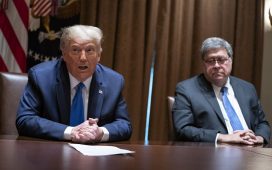With help from Stephanie Beasley and Tanya Snyder
PROGRAMMING NOTE: Morning Transportation will not publish on Monday, May 27. Our next Morning Transportation newsletter will publish on Tuesday, May 28. Please continue to follow Pro Transportation issues here.
Story Continued Below
Editor’s Note: This edition of Morning Transportation is published weekdays at 10 a.m. POLITICO Pro Transportation subscribers hold exclusive early access to the newsletter each morning at 6 a.m. To learn more about POLITICO Pro’s comprehensive policy intelligence coverage, policy tools and services, click here.
— Infrastructure talks between the White House and Democrats went up in flames. Can a surface reauthorization bill rise from the ashes?
— House appropriators unveiled their fiscal 2020 draft spending bill for transportation programs.
— Congressional Democrats are fuming over DHS plans to send TSA money and personnel to the border.
IT’S THURSDAY: Thanks for tuning in to POLITICO’s Morning Transportation, your daily tipsheet on all things trains, planes, automobiles and ports. Get in touch with feedback, tips or song lyric suggestions at smintz@politico.com or @samjmintz.
“She’s just a girl and she’s on fire / Hotter than a fantasy, lonely like a highway.”
LISTEN HERE: Follow MT’s playlist on Spotify. What better way to start your day than with songs (picked by us and readers) about roads, rails, rivers and runways?
INFRASTRUCTURE MEETING MELTDOWN: It wasn’t an unexpected outcome, but it did go down in dramatic fashion. A Wednesday morning White House meeting on infrastructure policy was derailed after President Donald Trump took umbrage at remarks by House Speaker Nancy Pelosi earlier in the day. For the juicy details from the room, POLITICO’s White House and Congress teams have you covered. For the transportation policy implications, keep it locked right here.
Could a big infrastructure compromise still happen? Chances seem slim. Trump initially said on Tuesday that Congress should pass the USMCA trade deal before it takes up infrastructure, but he set another marker at Wednesday’s five-minute meeting: He won’t work with Democrats while they’re pursuing oversight investigations.
So what’s next? Democrats, while surprised with how the meeting blew up, say they’ll push forward. After the meeting, House Transportation Chairman Peter DeFazio (D-Ore.) indicated he’ll pivot toward a surface transportation reauthorization, eschewing plans for a broader infrastructure package. It’s the approach Senate Republican leaders have preferred, which means the two chambers could be more on the same page now.
For what it’s worth: Pelosi said in a statement that “Democrats remain committed to an historic infrastructure package that is big, bold and bipartisan.”
What do Republicans think? Sen. John Barrasso (R-Wyo.), who will lead Senate efforts on the highway bill, said he doesn’t think the breakdown will affect that work. “Not at all,” he told MT. “[We’re] going to continue to work together on a major highway infrastructure bill. We’ve been working on it, we’ve had hearings, this isn’t going to stop it at all.” His fellow leadership member, Whip John Thune (R-S.D.), was slightly less optimistic. “It won’t make it easier, for sure,” Thune said. “But [a big infrastructure bill] was always going to be a heavy lift.” House Transportation ranking member Sam Graves (R-Mo.) echoed that. “That charade that Schumer and Pelosi are playing is one thing, but [DeFazio] and I’ll continue to work on this,” he said. “There wasn’t going to be a $2 trillion deal anyway.”
Also read: Our Kathryn A. Wolfe and Tanya Snyder on the oft-repeated death of Infrastructure Week.
IT’S SPENDING SEASON: The House Appropriations Committee released its fiscal 2020 draft spending bill for DOT on Wednesday. The topline: The legislation would give DOT a slight increase in funding compared with 2019 enacted levels, while staving off some major cuts that Trump requested. Your host summed it up for Pros. The legislation would preserve Amtrak funding, while maintaining spending levels for highway, transit, rail and aviation programs.
RIDING ALONG: Some of the most notable provisions in the bill are policy riders, and while many will be non-starters for Senate Republicans, they represent House Democratic appropriators’ first chance to flex their muscles after nearly a decade in the minority.
California high-speed rail: One rider would prevent the DOT from taking several actions against California’s high-speed rail project, including canceling grant agreements and pulling back funds. It would also force the federal agency to wait until litigation over the project (which was just initiated Wednesday) is complete before redirecting funds. Not surprising, but of note: The provision represents a complete 180 from House Republicans’ appropriations bills in past years that explicitly prohibited federal funds from going toward the project.
Other riders are on fuel economy standards, trucking meal and rest breaks, and Amtrak’s police force.
A ROASTING: Democrats on the House Homeland Security Committee grilled acting DHS Secretary Kevin McAleenan about his plan to send TSA employees to the southern border during a Wednesday hearing. As our Stephanie Beasley reports, McAleenan tried to assure members that TSA leadership would ensure airport security standards wouldn’t be affected. Meanwhile, ranking member Mike Rogers (R-Ala.) said he wished the Democratic majority was less focused on TSA workforce issues and more concerned about resolving what he referred to as “the actual crisis” at the border.
With a side of shade: Chairman Bennie Thompson (D-Miss) told reporters after the hearing that he doubted the veracity of the information he’d received from McAleenan about the TSA redeployment plan and had asked for a written copy of the department’s border strategy.
A LITTLE EXTRA LIGHTER FLUID: Stephanie also reports some lawmakers were both astonished and angered by reports that DHS wants to siphon $232 million away from TSA’s budget to help boost its border security operations, if Congress doesn’t provide supplemental funding. Rep. Bonnie Watson Coleman (D-N.J.), who sits on the Homeland Security and Appropriations committees, said she thought the department was trying to threaten Congress and that if it acted on the threat, “it certainly would impact how we would look at them moving forward, if they tried to do something like that and got away with it.”
Sen. Richard Blumenthal (D-Conn.) said in a letter to TSA that he was deeply concerned about the redeployments and possible fund diversion, and requested information on how the agency would maintain its operations.
EASA WANTS TO GO IT ALONE: Some news from around the world came in on the Boeing 737 MAX on Wednesday. First, POLITICO Europe’s Hanne Cokelaere and Joshua Posaner reported there are four “prerequisite conditions” that EU regulators have in place before they’ll allow the grounded MAX back into service. The big one: The European Aviation Safety Agency wants to approve extra design changes to the plane instead of relying on FAA approval.
Global aviation regulators are meeting in Texas today to discuss the issue, and our Brianna Gurciullo writes from Fort Worth that the shadow of global mistrust is coloring the gathering there. As she reports, 57 delegates representing more than 30 countries are expected to attend. The FAA has hoped the meeting will help move countries toward “allowing a smooth global return to flight for the beleaguered Boeing jet,” she writes.
As Brianna reported from a press conference with acting FAA administrator Dan Elwell later on Wednesday, he’s not worried about other countries’ desire to check his agency’s work. “Other countries will validate our certification of the MCAS change. … There’s very little in the aviation world that a country does that we blindly follow or vice versa.” Per international protocol, the FAA is expected to be the first to lift the grounding because the MAX was certified in the U.S.
At the same time, airlines are meeting in Montreal, and Bloomberg reported they’ve been tight-lipped ahead of the closed-door talks there.
THE LEGAL JOCKEYING BEGINS: The Trump administration has agreed to temporarily hold off redirecting $929 million in federal funding set aside for California’s high-speed rail project, POLITICO’s Debra Kahn reports from the West Coast. The agreement comes in response to a lawsuit launched by California earlier this week over the federal agency’s decision to rescind the funding.
SOLVING CAR CONGESTION: The latest in POLITICO Magazine’s “What Works” series looks at innovative ways cities are trying to solve transit problems, from density-focused light rail to congestion pricing to an outright car ban on the busiest streets. Now it’s your turn: If you could get one thing changed to improve transportation in your city — anything at all — what would it be? Tell us here and we’ll publish the most thoughtful responses.
— “American Airlines CEO commits to 737 Max fleet once it’s fixed.” NBC News.
— “DJI will add airplane and helicopter detectors to new drones in 2020.” The Verge.
— “Man dies in 3rd fatal Alaska plane crash in 8 days.” AP.
— “Consumer Reports: Tesla lane-change ‘requires significant driver intervention.” POLITICO Pro.
— “EPA promises aircraft greenhouse gas rule by September.” POLITICO Pro.
DOT appropriations run out in 130 days. The FAA reauthorization expires in 1,591 days. Highway and transit policy is up for renewal in 497 days.








